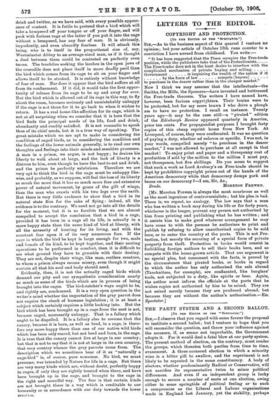LETTERS TO THE EDITOR.
COPYRIGHT AND PROTECTION.
[To THE EDITOR Or THII “SPROTATOILl SID,—As to the business aspect of this quarrel I venture no opinion; but your article of October 13th runs counter to a
conviction I have nursed from childhood. You write :—
"It has been suggested that the Times occupies the Free-trade
position, while the publishers take that of the Protectionists The Free-trader does not in the least desire to interfere with the complicated mechanism of private buying and selling Government is impairing the wealth of the nation if it by the force of law compels [buyers] . . . . . . to purchase in the dearer rather than in the cheaper market."
Now I think we may assume that the intellectuals—the Smiths, the Mills, the Spencers—have invented and buttressed the Free-trade theorem. The writers I have named have, however, been furious copyrighters. Their brains were to
be protected, but for my mere brawn I who drive a plough am to have no protection. I recall an instance. Twenty years ago—it may be the case still—a " pirated " edition of the Edinburgh Review appeared quarterly in America, price ten cents. For propagandist purposes I brought forty copies of this cheap reprint home from New York. At Liverpool, of course, they were confiscated. It was no question of paying a duty, whether ad valorem or specific. I was not, in your words, compelled merely "to purchase in the dearer market," I was not allowed to purchase at all except in that market ! To enjoy print and paper and a threepenny cost of production if sold by the million to the million I must pay, not threepence, but five shillings. Do you mean to suggest that such a work as Lord Avebury's on Free-trade should be kept by prohibitive copyright prices out of the hands of the American democracy while that democracy dumps pork and beans on our democracy P—I am, Sir, &c., [Mr. Moreton Frewen is always the most courteous as well as the most ingenious of controversialists ; but his plea is bad. There is, we repeat, no analogy. The law says that a man who has written a book may during his life or for forty years, whichever is the longer, prevent any person not authorised by him from printing and publishing what he has written ; and it assists him to make good whatever arrangement he may have come to with the persons he authorises to print and publish by refusing to allow unauthorised copies to be sold here, or to enter the country at the ports. This is not Pro- tection, but merely the securing of a special form of private property from theft. Protection in books would consist in forbidding foreign authors to sell their books here, and so compete with the home-grown article. That our argument is no special plea, but consonant with the facts, is proved by the circumstance that pirated books, or books in regard to which the author has only authorised the sale abroad (Tauchnitzes, for example), are confiscated, like burglars' tools, not subjected to a duty, like spirits or beer. Again, the author must inform the officials at the ports that he wishes copies not authorised by him to be seized. They are not seized merely because they are produced abroad, but because they are without the author's authorisation.—ED. Spectator.]














































 Previous page
Previous page